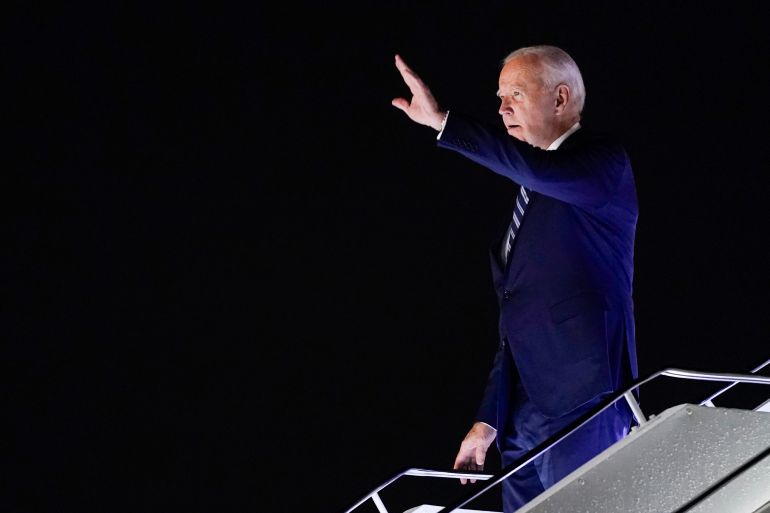Biden and Modi pledge to deepen ties in talks ahead of G20 summit
US and Indian leaders promise support for ‘free, open’ Asia-Pacific region as countries seek to counter rise of China.

US President Joe Biden and Indian Prime Minister Narendra Modi have pledged to deepen ties between their two countries, as the leaders held direct talks ahead of a Group of 20 summit in New Delhi at the weekend.
In a joint statement on Friday, shortly after Biden landed in the Indian capital, the US and India reaffirmed their support for “a free, open, inclusive, and resilient Indo-Pacific” as members of the Quad alliance, which also includes Australia and Japan.
Keep reading
list of 3 itemsAs Biden, Modi meet, a flurry of US and India deals
India’s Modi gov’t replaces country’s name with Bharat in G20 dinner invite
The talks marked the second in-person meeting between Biden and Modi since June, when the Indian leader made an official state visit to the White House as part of the countries’ push to bolster their alliance in the face of China’s growing influence.
“Many say that right now, it’s really a kind of golden age when it comes to the ties between the US and India. Things have almost never been better,” Al Jazeera’s Katrina Yu reported from New Delhi on Friday ahead of the Biden-Modi meeting.
“Undoubtedly, what’s bringing these two sides together is their bonding over their shared concern over … China’s rising influence in the region,” she said.
The US is hoping to boost India “as a possible counterweight” to China, Yu said, as Washington views Beijing as its top global competitor and ties between the pair have been tested in recent years over a number of issues.
For his part, Modi is hoping “to project India … as an alternative leader of the Global South, a title really that Beijing – arguably – currently holds”, Yu added.
India late last month lodged an objection through diplomatic channels with Beijing over China’s new standard map that lays claim to India’s territory along their shared border.
The map was released just days after Modi and Chinese President Xi Jinping met on the sidelines of a summit of the BRICS bloc of developing economies — Brazil, Russia, India, China and South Africa — and agreed to work to de-escalate tensions at their disputed border.
US-India deals
On Friday, Modi and Biden also discussed a number of deals that were reached during their June talks in Washington, DC.
Biden welcomed a deal to allow General Electric to produce jet engines in India to power Indian military aircraft, according to the joint statement, as well as an agreement for India to purchase US drones.
Biden and Modi also “re-emphasized the shared values of freedom, democracy, human rights, inclusion, pluralism, and equal opportunities for all citizens are critical to the success our countries enjoy and that these values strengthen our relationship”, the statement said.
But the Biden administration has faced criticism from rights advocates who say it is ignoring the Modi government’s targeting of minorities, as well as an erosion of democracy and human rights in India.
For the fourth straight year, an independent US commission in May recommended adding the Indian government to a religious freedom blacklist, saying that conditions for religious minorities in the country “continued to worsen” throughout 2022.
India has rejected previous reports by the panel and accused senior US officials of making “ill-informed” and “biased” comments.
Speaking to reporters on Thursday, White House National Security Adviser Jake Sullivan said the Biden-Modi talks would be a follow-up to the discussions they had in June.
“Of course, President Biden will also speak on critical, fundamental values that the United States stands for, as he does in all of his engagements,” he added.
Sullivan as well as US Secretary of Treasury Janet Yellen joined the Biden-Modi meeting on Friday, the White House said in an earlier statement. Indian government attendees included External Affairs Minister Subrahmanyam Jaishankar and security adviser Ajit Doval.
G20 summit
Biden is also hoping that his presence at the G20 summit on Saturday and Sunday will demonstrate that the US and its like-minded allies are better economic and security partners than China.
White House officials said the US president will use the gathering as an opportunity for Washington to highlight a proposition for developing and middle-income countries that would increase the lending power of the World Bank and International Monetary Fund by some $200bn.
That is an attempt to offer a significant, albeit smaller, alternative to China’s massive Belt and Road infrastructure initiative.
China, which is also a member of the G20, has said that Xi will not attend the G20 summit and is instead dispatching Premier Li Qiang to represent the country.
Xi’s absence “affords the Biden administration even more of a chance to go on the offensive in terms of stepping up and showing … what their value proposition is to the Global South”, Colleen Cottle, deputy director at the Atlantic Council’s Global China Hub, told The Associated Press news agency.